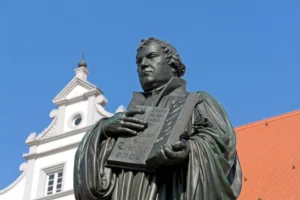In their book Why We’re Not Emergent (By Two Guys Who Should Be) authors Kevin DeYoung and Ted Kluck give a grocery list of ways to tell “that you might be an emergent Christian.”
First they list cultural habits:
If you listen to U2, Moby, and Johnny Cash’s Hurt (sometimes in church), use sermon illustrations from The Sopranos, drink lattes in the afternoon and Guinness in the evenings, and always use a Mac.
Later in the two-page list, they enumerate verbal tendencies they’ve observed in those who identify with the burgeoning movement:
… if you loathe words like linear, propositional, rational, machine, and hierarchy and use words like ancient-future, jazz, mosaic, matrix, missional, vintage, and dance….
As I read their list I had to smile. I have many friends who are involved with the emerging church — a loosely knit community of young adults disillusioned with church as usual — and I have to admit, this description had them pegged.
I’m no stranger to the movement myself. In fact I’ve been involved with several churches that wore the emerging label, but lately there have been some parts of the “conversation” that concern me. And they have nothing to do with listening to U2, Moby or Johnny Cash.
Rather they involve subtle — but potentially dangerous — views of truth. Most emerging thinkers have what philosophers would call a low epistemology — that is, a highly skeptical attitude about the ability of the human mind to grasp ultimate reality. What’s really insidious is that this postmodern quirk expresses itself in nice-sounding phraseology. In reference to Christian doctrine they talk about “humility” and the need to “embrace mystery.” Unfortunately, from what I can tell, such words are often code for an unwillingness to affirm core tenets of the Christian faith.
It’s not that I don’t understand the attraction of this kind of stance. Before attending Seminary I’d read works from several emerging church thinkers. And they’d had an impact. I recall settling into a desk near the back of the lecture hall of my first Systematic Theology class, with a bad attitude. I believed that theology — especially the systematic kind — sucked the life out of Christian faith. It left no room for mystery. Theologians were an arrogant lot, I had decided, bent on solving the Bible as if it were a math problem.
Though I fancied myself a maverick, my ideas were not completely original. I’d been influenced by writers such as the emerging church’s de facto leader Brian McLaren who loves to cite theological formulations as evidence of the church’s arrogance. McLaren and his ever-growing throng of acolytes have vowed not to repeat what they see as the mistakes of traditional Christianity.
Even prominent pastors are echoing this refrain. In an interview with Christianity Today, mega church pastor (and popular emerging thinker) Rob Bell said that after “discovering the Bible as a human product,” he wanted to “embrace mystery rather than conquer it.” Bell’s wife, Kristen, who also took part in the interview, elaborated on her husband’s comments. “I grew up thinking that we’ve figured out the Bible,” she said, “that we knew what it means. Now I have no idea what most of it means.””The Emergent Mystique,” Christianity Today, November, 2004.
Looking back at the church of my childhood, it’s easy to see why this kind of message resonated with me. I grew up in a tradition that didn’t exactly encourage questions. We had every truth pegged — right down to the exact timeframe for the rapture. (It was pre-tribulation, in case you were wondering.) And if you didn’t agree, you were welcome to take your doubt elsewhere. We weren’t big on examining our beliefs or asking questions and we expressed what we knew with ironclad certainty.
The position of the emerging church writers seemed more honest and, yes, humble. Instead of dwelling on propositional truths (stand alone beliefs) they preferred stories. And, instead of exuding unflinching confidence, it seemed they made room for mystery.
But like most reactionary movements, they have swung too far in the opposite direction. Oddly enough, it was my Systematic Theology professor who led me to question the positions I’d unconsciously adopted. Doctrine was not the enemy of mystery, she contended. It was quite the opposite. She taught us that doctrine actually serves to preserve mystery.
To illustrate the point, she pointed to the Trinity — an admittedly perplexing doctrine, oft criticized for its alleged attempt to explain the unexplainable. She observed that Trinitarian theology simultaneously asserts both the oneness of God and a plurality of persons in the godhead. But this apparent contradiction prevents us from indulging our urge to collapse the categories and neatly explain the nature of God as either one or three. We’re forced to accept both. The Trinity then is not an airtight formula about God that banishes all mystery. Rather it’s a high wall around our conception of God that says to our insatiable drive for understanding, “You can go no further.” It preserves the mystery.
The way emerging church proponents use the word mystery is telling. To writers like McLaren and Bell, preserving mystery means not being too adamant about our beliefs. For Tony Jones, National Coordinator of the Emergent Village, it means something even more radical. It means being ready to say of our faith that “we could very well be wrong about all of this.”Why We’re Not Emergent: By Two Guys Who Should Be Moody Publishers, Chicago IL, 2008. pp. 228.
The Bible’s treatment of the topic is strikingly different. Contrast emerging use of mystery with the way Jesus speaks of mystery to his disciples: “And he said, ‘To you it has been granted to know the mysteries of the kingdom of God'” (Luke 8:10). In this verse, mystery is for the knowing — not an excuse for half-hearted faith.
Paul uses the Greek word mystãrion — from which we get our word mystery — 20 times in the New Testament. And not once does he employ the word to air doubts or to revel in uncertainty. Instead he points to the joyous fact that God has made mysteries known. For Paul, mystery always opens in revelation through Jesus Christ. That’s the good news — that God hasn’t left us in the dark, but has revealed his mystãrion in the person of His son.
That’s quite different from using mystery as a smokescreen to hide wishy-washy beliefs. My fear is that often even those outside the emerging church have bought into a watered down version of belief under the guise of embracing mystery, when what they’re really imbibing is doubt about beautiful and life-giving truths.
Let me make an important qualifier. There is much to commend about the emerging church. They have made some biting — but often justified — critiques of American evangelicalism. And I’m not against their efforts to change the methodology of doing church. The emerging church has introduced different styles of worship that resonate with a young, creative, urban demographic and for that I’m grateful. Every generation must incarnate the gospel differently to reach people in a changing culture.
What can’t change is the essence of that gospel and our ability to know and proclaim it with confidence. We must join our voices with the chorus of Scripture in boldly affirming the truths of our faith, for our God is a restless revealer who desires to make His mysteries known.
Copyright 2008 Drew Dyck. All rights reserved.









